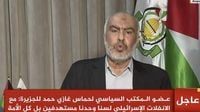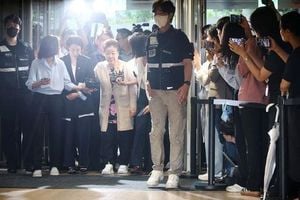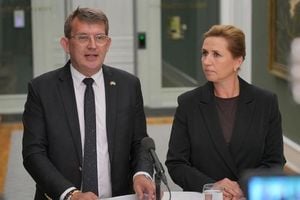In a striking turn of events, senior Hamas official Ghazi Hamad emerged publicly on September 17, 2025, for the first time since surviving an audacious Israeli airstrike in Doha, Qatar. The attack, which occurred on September 9 as part of what Israeli sources dubbed "Operation Summit of Fire," targeted some of the highest-ranking members of Hamas during a high-level meeting. Hamad’s appearance—calm but defiant—in an Al Jazeera interview has reignited debate over the effectiveness, ethics, and geopolitical fallout of Israel’s cross-border actions, as well as the increasingly complicated efforts to end the conflict in Gaza.
Hamad, a member of the Hamas political bureau and chairman of the Gaza Energy Authority, did not mince words as he recounted the harrowing moments of the attack. "We were discussing a ceasefire proposal, less than an hour after the meeting began, we heard an explosion," he told Al Jazeera, according to BBC and other sources. "The rockets came down consecutively, without a pause, around 12 missiles in less than a minute." Hamad, who is also a key negotiator for Hamas, added that as residents of Gaza, they instantly recognized the sounds of an Israeli strike. "We tried to flee as quickly as possible, and we succeeded," he said, his relief palpable even through the screen.
The Israeli airstrike in Doha reportedly targeted a who’s-who of Hamas leadership: Khalil al-Hayya, Khaled Mashaal, Zaher Jabarin, and others, all present to discuss an American proposal aimed at ending the war in Gaza. Despite Israel’s initial claims of success, the operation failed to eliminate its primary targets. Instead, it resulted in the deaths of six people—one Qatari military officer and five lower-ranking Hamas members—while the senior leadership, including Hamad, survived unscathed. According to Al Jazeera and The Times of Israel, the attack was met with widespread international criticism, including a rare public rebuke from the United States, which assured Qatar that such an incident would not be repeated.
Hamad’s interview shed light not only on the attack itself but also on the broader dynamics at play. He was candid in his criticism of American mediation efforts, describing them as deeply flawed. "Our experience with the American mediator was bitter, and there was no credibility on the American side because they withdrew from their proposals," he said. He went further, accusing the U.S. of being complicit in the violence: "The Americans are partners in the ongoing genocide. They presented the proposal, and when Hamas discussed it, Trump gave them permission to bomb the Hamas delegation in Qatar. Trump speaks on behalf of the Israelis and supports the killing of Palestinians." These statements, reported by Al Jazeera and Haaretz, reflect the growing mistrust between Hamas and U.S. negotiators, complicating prospects for a ceasefire.
Hamad’s political biography is as storied as it is controversial. He joined the Muslim Brotherhood at the age of 16 and became a founding member of Hamas in 1987, later serving five years in Israeli prison for his involvement with the group. Over the years, he has held several key positions, including deputy foreign minister and spokesperson for Hamas, and played a pivotal role as a mediator in the 2011 Gilad Shalit prisoner exchange. As chairman of the Gaza Energy Authority, he wields significant influence within the movement and its governance structures.
The timing of the airstrike was particularly sensitive. The Hamas delegation was reportedly deep in talks over an American ceasefire proposal when the missiles struck. According to Hamad, "We were in a meeting with the negotiating delegation and with several advisors. Less than an hour after the discussion began about the American proposal we had received, we heard enormous explosions." Other senior Hamas figures, such as Khalil al-Hayya, Zahir Jabarin, Khaled Meshal, Mousa Abu Marzouk, and Izzat al-Rishq, were all reportedly present at the meeting, though most escaped unharmed.
The fallout from the attack has been significant, both on the ground and in diplomatic circles. Efforts to secure the release of 48 Israeli hostages—about 20 of whom are believed to be alive—have stalled, hampered by renewed violence and deepening mistrust between the negotiating parties. Hamad insisted in his interview that Hamas treats prisoners "according to our values despite the massacres against our people. Those putting them at risk are the occupiers themselves." He also rejected outside influence on how Hamas handles its prisoners, stating, "We are not afraid of Trump’s threats to unleash hell upon us. We do not take orders from him on how to treat enemy prisoners. We treat them according to our own methods and according to our religion."
Meanwhile, the situation in Gaza remains dire. According to hospital sources cited by Haaretz, at least 75 Palestinians were killed by Israeli Defense Forces (IDF) fire on September 17 alone, including 53 in Gaza City. The IDF announced the opening of an additional escape route from Gaza City to the south via Salah al-Din Street, available until September 19 at noon, in an attempt to facilitate the movement of displaced civilians. Large numbers of people were seen leaving Gaza City under the shadow of the ongoing IDF ground offensive.
The Israeli government, for its part, has framed the Doha airstrike as a message to Hamas leadership. Prime Minister Benjamin Netanyahu declared that the operation proved Hamas leaders are not safe anywhere, warning, "We will get them the next time." Yet, the attack has also exposed cracks in Israel’s alliances, with the U.S.—a crucial partner—publicly distancing itself from the operation and reaffirming its commitment to Qatar’s sovereignty.
Public pressure within Israel is mounting as well. On September 16 and 17, more than 150 protesters, including families of hostages, gathered outside Prime Minister Netanyahu’s residence in Jerusalem, demanding an end to the war and the immediate release of the hostages. Their frustration underscores the growing impatience among Israelis for a resolution to the conflict and the safe return of their loved ones.
The Doha airstrike and its aftermath highlight the tangled web of military action, diplomacy, and public sentiment that defines the Israeli-Palestinian conflict today. With senior Hamas leaders surviving assassination attempts, American mediation under fire, and civilians bearing the brunt of renewed hostilities, the path to peace seems as elusive as ever. Yet, as Hamad’s survival and public re-emergence demonstrate, the key players remain undeterred—and the world continues to watch, waiting for the next move in this high-stakes drama.




